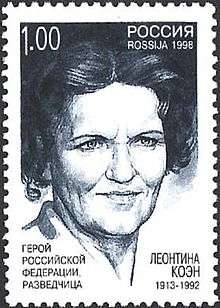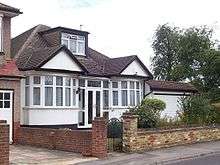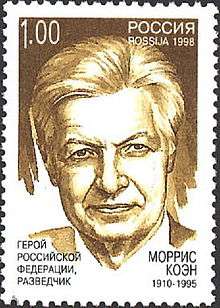Lona Cohen
| Lona Cohen | |
|---|---|
 Lona Cohen on Russian stamp | |
| Born |
Leontine Theresa Petka January 11, 1913 Adams, Massachusetts |
| Died |
December 23, 1992 (aged 79) Moscow |
| Nationality | American |
| Spouse(s) | Morris Cohen |
| Spying career | |
| Allegiance | USSR |
| Active | 1939–1961 (arrest) |
| Codename(s) | Helen Kroger |
Lona Cohen[1] (January 11, 1913 – December 23, 1992), born Leontine Theresa Petka, also known as Helen Kroger, was an American spy for the Soviet Union. She was the wife of spy Morris Cohen.
Espionage
Lona Cohen was born Leontine Theresa Petka in Adams, Massachusetts, the daughter of Polish Catholic immigrants.[2] An American citizen, she was a member of the Communist Party USA and had been recruited into Soviet espionage in 1939 by her husband, Morris. She worked for Soviet case officers, including Anatoli Yatskov, out of the New York rezidentura during World War II.
After her husband was drafted in 1942, Cohen ran a network that included engineers and technicians at munitions and aviation plants in the New York area. One of her sources smuggled a working model of a new machine gun out of a munitions plant. She worked at two defense plants, the Public Metal Company in New York City in 1941 and the Aircraft Screw Products plant on Long Island in 1943.
She was a courier who picked up reports from Theodore Hall, and a source cover named "FOGEL" and "PERS" from the American secret atomic weapons project at Los Alamos, New Mexico and carried them to the Soviet consulate in New York, where a KGB sub-residency under a young engineer, Leonid R. Kvasnikov, coordinated operations and dispatched intelligence to Moscow.
After the defections of Elizabeth Bentley and Igor Gouzenko, the Cohens ended contact with Soviet intelligence until 1949, at which time they began working with Col. Rudolph Abel, a U.S. based illegal resident. After Klaus Fuchs was arrested in the United Kingdom in 1950, Cohen and her husband fled to Moscow, where she received additional training as a radio operator and cipher clerk. In 1954, the pair resurfaced in London under the names Helen and Peter Kroger with New Zealand passports. They set up an antiquarian book business which was cover for their activities of running the London Illegal Rezidentura. Gordon Lonsdale worked with them as part of the Portland Spy Ring.
While in London, the Cohens were friends with Frank and Nora Doel. Frank Doel is the bookseller whose correspondence with the author Helene Hanff became the bestseller, 84 Charing Cross Road. In her follow-up book, The Duchess of Bloomsbury Street, Hanff reported an anecdote told her by Nora Doel.[3] One New Year's Eve, the Doels gave a party at which Lona Cohen (aka Helen Kroger):
arrived looking very exotic in a long black evening dress. 'Helen, you look like a Russian spy!' said Nora. And Helen laughed and Peter laughed and a few months later Nora picked up the morning paper and discovered that Helen and Peter Kruger were Russian spies.
Imprisonment

In the basement of their house, at 45 Cranley Drive, Ruislip, situated not far from the military airfield of Northolt, they set up a high speed radio transmitter and began sending Moscow "information of special importance". In January 1961, they were arrested for espionage, and in March, she received a sentence of 20 years while her husband got 25 years, of which they served only eight, until in 1969, the two were finally exchanged with the Soviet Union for a British subject called Gerald Brooke.
Before being taken in custody, Mrs. Kroger had asked permission to stoke up the boiler. Before she could do so, Detective Superintendent Smith, a veteran "spy catcher" who was in charge of the arrest, insisted on checking her handbag first. It was found to contain microdots, the photographic reduction of documents, in order to make them small enough to be smuggled out of the country more easily.
Personal and death

In 1941, Cohen married Morris Cohen, who recruited her to his espionage activities.
Cohen died in Moscow on December 23, 1992.
Awards
Lona Cohen was awarded the Order of the Red Banner and Order of Friendship of Nations by the Soviet Union.
Legacy
Once in Moscow, the Cohens continued training colleagues for illegal intelligence operations.[4]
In 1983, the British playwright Hugh Whitemore dramatized the case as Pack of Lies, which was performed in London's West End theatre district starring Judi Dench and Michael Williams. It played on Broadway for 3½ months in 1985, for which Rosemary Harris won the best actress Tony award for her portrayal of the British neighbor of the Cohens/Krogers. It was made into a TV movie starring Ellen Burstyn, Alan Bates, Teri Garr and Daniel Benzali (as "Peter Schaefer," i.e., "Peter Kroger," i.e., Morris Cohen) which aired in the U.S. on CBS in 1987. The plot centered on the neighbors (and seeming friends) whose house was used as a base from which the security services could spy on the Cohens, and the way paranoia, suspicion and betrayal gradually destroyed their lives during that time.
The Cohens' cover as antiquarian book dealers Peter and Helen Kroger is mentioned in Helene Hanff's The Duchess of Bloomsbury Street because they were friends of London book dealer Frank Doel, recipient of the letters and book orders that inspired the bestseller 84 Charing Cross Road.
References
- ↑ Cornwell, Rupert (February 26, 1996). "Physicist accused of being spy for Stalin". The Independent. Retrieved October 22, 2014.
- ↑
- ↑ Hanff, Helene (1976). The Duchess of Bloomsbury Street. Avon. ISBN 0-380-00634-0.
- ↑ Deep Cover: My Secret Life and Tangled Allegiances as a KGB Spy in America, by Jack Barsky with Cindy Coloma, Carol Stream, IL: Tyndale Momentum. Chapter 16 is entirely about a KGB agent's memoir of being trained by the Cohen's in Moscow in the late 1970s.
External sources
- Albright, Joseph; Kunstel, Marcia (1997). Bombshell: The Secret Story of America's Unknown Atomic Spy Conspiracy. New York: Times Books. pp. 244–253.
- Haynes, John Earl; Klehr, Harvey (1999). Venona: Decoding Soviet Espionage in America. New Haven: Yale University Press. pp. 316, 317–319, 320, 321, 334. ISBN 0-300-08462-5.
- Russian Federal Foreign Intelligence Service (1995). Veterany vneshnei razvedki Rosii (Veterans of Russian foreign intelligence service). Moscow: Russian Federal Foreign Intelligence Service.
- Trahair, Richard C.S.; Miller, Robert (2009). Encyclopedia of Cold War Espionage, Spies, and Secret Operations. New York: Enigma Books. ISBN 978-1-929631-75-9.
- West, Rebecca (1964). The New Meaning of Treason. New York: Viking. pp. 281–288.
- Carr, Barnes (2016) Operation Whisper; The Capture of Soviet Spies Morris and Lorna Cohen ForeEdge Books/ UPNE ISBN 9781611688092
- BBC. "On This Day: 13 March 1961: Five Britons accused of spying for Moscow". Includes a video news report on the Krogers/Cohens' return to the Soviet Union and an interview with former Foreign Secretary George Brown over the issues.
- Chervonnaya, Svetlana. "Red Files: Secret Victories of the KGB - Svetlana Chervonnaya Interview". PBS.
- Federal Bureau of Investigation. "Subject: Morris and Lona Cohen, File Number: 100-406659".
- Russian Foreign Intelligence Service (SVR) (in Russian)